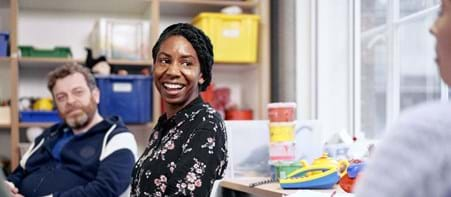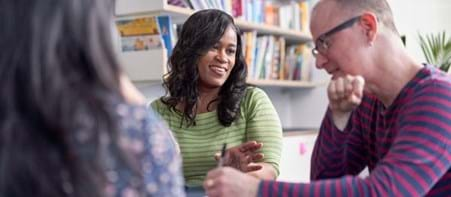We want to make sure you're able to fill out your bursary application to the best of your ability.
On this page, you can learn more about what you’ll be asked in the bursary application form. We advise you to familiarise yourself with what you need to include and prepare your answers before filling out your application form.
You can find answers to the most frequently asked questions about our Bursary Pathway at the bottom of this page. If you need help filling out your application or have any other questions, please contact our friendly team at qualify@place2be.org.uk.
Understanding your bursary application
Your bursary application form is divided into several sections to help our team properly understand and evaluate your situation. These include:
- expenditure and financial situation spreadsheet
- under-represented characteristics
- counselling training qualifications
- relevant employment experience
- supporting statements
- references
- living and financial situation
- requests for additional learning support
- safeguarding questionnaire.
Please note that we'll also ask for your personal details in your application so we can contact you about potential next steps.
Expenditure & Financial Situation spreadsheet
You'll need to complete our Expenditure & Financial Situation spreadsheet before starting your application. The completed spreadsheet will be part of your application form. If you need help filling this out, contact one of our helpful team at qualify@place2be.org.uk.
Download Expenditure & Financial Situation spreadsheet (29kb)
Under-represented characteristics
It's important to us that those working as counsellors for children and young people reflect pupils in our schools, and our bursaries will prioritise funding and supporting those from under-represented groups in the counselling profession.
Some of these questions are mandatory as we are required to submit the information to the Counselling and Psychotherapy Central Awarding Body if you secure a place on our Introduction to Child Counselling Skills (Level 2 Award) or our Intermediate Child Counselling Skills (Level 3 Certificate). You don't need to provide answers to the non-mandatory questions, but doing so will help support your application if you're from an under-represented group. Questions you'll be asked in this section include:
- your age
- your gender identity*
- if your gender matches the sex you were assigned at birth (or in early childhood)
- if you consider yourself to have a physical or mental impairment or disability*
- your ethnic background*
- your religion or belief
*mandatory.
Counselling training qualifications
We'll ask you to provide details of any counselling training qualifications you have completed with Place2Be or elsewhere (e.g., Level 2 Award in Counselling Skills or similar).
Relevant employment experience
Please provide details of any relevant employment history that could support your application to study as a child counsellor. This could include:
- paid or voluntary work
- employment directly related to counselling or working with children
- your current employment and previous jobs you have held to help us gain an understanding of your personal journey into counselling.
Supporting Statements
We'll ask you to answer the following five questions in your bursary application. Please make sure these statements are your own work. Each question has a 1,500-character limit (215 and 375 words with spaces included). We recommend preparing your answers in advance before starting your application.
- Why do you want to undertake this training, and what do you hope to gain from the course?
- Why do you feel that now is the right time to begin?
- What skills and knowledge have you developed from looking after or working with children?
- In what way does your own experience of childhood influence the way that you interact with children?
- What hopes and concerns do you hold about being an adult, training and learning to be a counsellor within a diverse group of people?
- Describe some activities that you engage in that promote personal development and self-awareness, and outline how this benefits you.
What are we looking for in your supporting statement answers?
You will be assessed based on a range of criteria, and there are some key skills and understandings that we are particularly looking for, which we've detailed below.
- Your honesty, openness, ethical integrity, creativity and imagination will be assessed through your application answers. We want to get a real sense of your purpose and vision for taking on this training.
- Your awareness of the nature of prejudice and oppression and issues of difference and equality
- Self-awareness and the ability to reflect are key skills required to be a counsellor, particularly reflecting on your own experiences, values and beliefs and how these shape and influence your interactions with others. While these skills will be developed during the training courses, we are looking for a basic ability to be self-critical and for you to demonstrate insight into your strengths, weaknesses, and areas for growth, as well as a willingness to learn and adapt.
- Capacity for self-management through your application answers, e.g. your ability to take responsibility for your own behaviour and wellbeing. This could include you having thought through how you will manage the demands of the course and how you will support yourself throughout the learning process.
- A genuine interest in training as a child counsellor, with a clear motivation for helping others and supporting children and young people's mental health.
Reference requests
If you are offered a bursary place on Place2Be's Intermediate Child Counselling Skills (Level 3 Certificate) course, we'll ask you to source two references to accompany your application. This should include:
- a clinical academic reference (e.g. a course tutor or supervisor)
- a character reference.
Neither reference can be a family relative. It is your responsibility to source your own references and ensure your referees completes these, this includes sourcing references from Place2Be tutors or employees.
Living and financial situation
In this section of your application, you will be asked to provide information about your living and financial circumstances to help us understand your eligibility for the bursary. We'll ask you:
- to confirm that your annual household income is less than £35,000 if applying for a course in London or less than £30,000 if applying for a course outside of London (Eg. Huddersfield or Manchester)
- what the highest level of qualification you've received is
- if you receive free school meal entitlement (when you were a child), Universal Credit, Personal Independence Payment (PIP), Carer’s Allowance, Disability Living Allowance, or any other means-tested benefits
- who you live with
- if any dependents under the age of 18 currently living in your household and if these dependents receive Special Educational Needs (SEN) support at school
- if you're a single parent
- if you've ever been in the care of, or have been given accommodation by, your local authority for a period of at least 13 weeks
- if you're the first person in your family to go into further education.
We'll also ask you for longer-form answers to the following questions. Your answers should be under 1,500 characters (215 to 375 words with spaces included).
- Please elaborate on your current living and financial circumstances and what has led you to apply for a Place2Be bursary.
- Please indicate how you would complete your training if you don't receive a bursary.
- Are there any additional challenges you may face while studying, and how will you overcome them?
Additional Learning Support
You can request additional learning support and/or reasonable adjustments that may be required to support your learning.
Safeguarding Questionnaire
The following questions are part of Place2Be's standard safeguarding procedures. Disclosing any relevant information at this stage will not automatically disqualify you from our counselling training courses.
The information you provide will be shared with our internal safeguarding panel for review. If you fail to disclose relevant information at this point and it comes up in later application stages (e.g. during an interview), this will negatively impact the outcome of your application.
- Do you have any criminal convictions?
- As an adult, have you been involved with a local authority regarding care or child protection proceedings in your family?
- Have you ever had a child protection or safeguarding concern raised or an allegation made against you?
- Has anyone you are personally connected to ever had a child protection or safeguarding concern raised or an allegation made against them?
- Have you ever had any personal involvement with Social Services or the Police concerning safeguarding?
Sign up to hear from us
By signing up to hear from us, you'll get the latest news and updates straight to your inbox. Applications for our bursaries are open at different times of the year:
- Bursaries for our Level 2 Award and Level 3 Certificate will open in April.
- Bursaries for our Level 4 Diploma and Postgraduate Diploma will open in November.
Sign up to receive our updates to find out exactly when the bursary application window is open.







